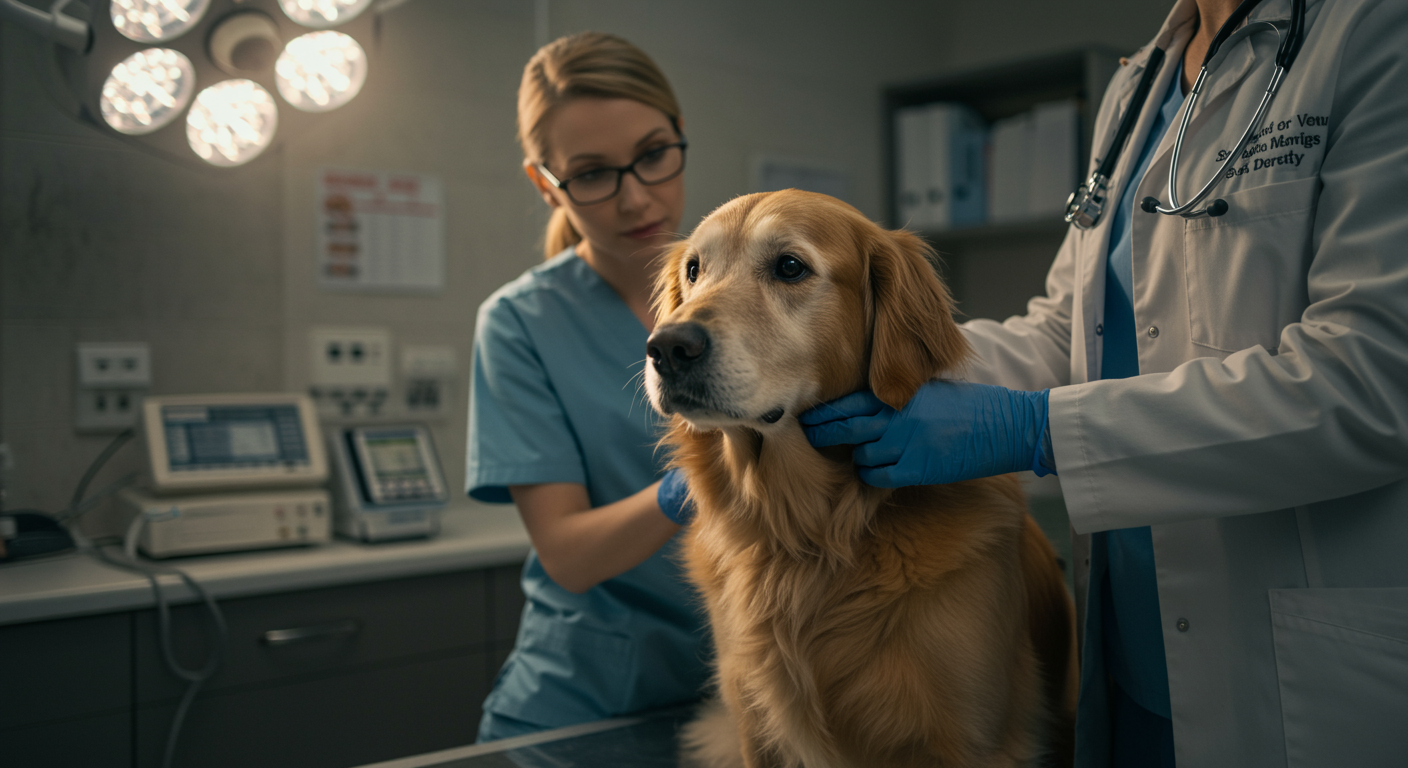Selecting the appropriate veterinarian for senior Golden Retrievers requires careful consideration of specialized knowledge, experience with aging dogs, and practice capabilities that support comprehensive geriatric care. The right veterinary partnership becomes increasingly important as dogs age and require more frequent monitoring, specialized treatments, and coordinated care for multiple health conditions.
Senior Golden Retrievers benefit from veterinarians who understand age-related health changes, have experience managing chronic conditions common in older dogs, and maintain practice environments that accommodate the unique needs of aging companions. Finding the right fit ensures optimal health care while providing peace of mind for families caring for senior dogs.
Effective veterinary selection involves evaluating qualifications, practice philosophy, facility capabilities, and communication styles that align with senior dog needs and family preferences. The goal is establishing long-term partnerships that support comprehensive care throughout the golden years.
Understanding Senior Dog Veterinary Needs
Specialized Geriatric Knowledge
Age-Related Health Expertise
Veterinarians experienced in senior dog care understand the complex interplay of aging processes, chronic disease management, and quality of life considerations that characterize geriatric veterinary medicine.
Understanding geriatric expertise helps families identify practitioners who can provide comprehensive care while recognizing subtle health changes that may indicate developing conditions requiring early intervention.
Specialized knowledge in pain management, cognitive support, and end-of-life care becomes increasingly important as dogs age and face complex health challenges requiring nuanced treatment approaches.
Breed-Specific Experience
Golden Retrievers have predispositions to specific health conditions such as hip dysplasia, cancer, and heart disease that benefit from veterinarians familiar with breed-specific health patterns and preventive care strategies.
Understanding breed expertise helps families find practitioners who can provide targeted screening, early detection, and appropriate management for conditions commonly affecting Golden Retrievers throughout their senior years.
Experience with Golden Retriever health patterns enables veterinarians to recognize early signs of breed-specific conditions while implementing appropriate monitoring and preventive care protocols.
Comprehensive Care Capabilities
Multi-System Health Management
Senior dogs often require management of multiple concurrent health conditions, making veterinarians skilled in coordinating complex treatment plans essential for optimal care outcomes.
Understanding comprehensive care needs helps families identify practitioners capable of managing medication interactions, coordinating specialist referrals, and maintaining overall health while treating specific conditions.
Integrated care approaches that consider all aspects of senior dog health help ensure that treatments for individual conditions support rather than compromise overall well-being and quality of life.
Preventive Care Focus
Veterinarians emphasizing preventive care help maintain senior dog health through early detection, routine monitoring, and proactive interventions that prevent minor issues from becoming serious problems.
Understanding preventive approaches helps families find practitioners who prioritize wellness maintenance while providing comprehensive screening and monitoring appropriate for aging dogs.
Regular health assessments, diagnostic testing, and lifestyle counseling help maintain optimal health while catching potential problems when treatment options are most effective.
Veterinary Selection Criteria Guide
| Selection Factor | Key Considerations | Evaluation Methods | Questions to Ask | Red Flags to Avoid |
|---|---|---|---|---|
| Senior Experience | Years treating geriatric dogs | Review credentials, ask about caseload | “What percentage of your patients are senior dogs?” | Limited senior dog experience |
| Facility Capabilities | Diagnostic equipment, treatment options | Tour facility, review services | “What diagnostic capabilities do you have on-site?” | Outdated equipment, limited services |
| Communication Style | Clear explanations, listening skills | Consultation interactions | “How do you explain complex medical information?” | Rushed appointments, poor communication |
| Emergency Support | After-hours care, emergency protocols | Review policies, contact procedures | “What emergency support is available?” | No emergency coverage, unclear protocols |
| Cost Transparency | Clear pricing, payment options | Discuss fees upfront | “Can you provide treatment cost estimates?” | Hidden fees, pressure for expensive treatments |
| Philosophy Alignment | Quality of life focus, treatment approaches | Discussion of care philosophy | “How do you approach end-of-life decisions?” | Aggressive treatment focus only |
Evaluating Veterinary Qualifications
Professional Credentials and Training
Educational Background
Veterinarians with additional training in geriatric medicine, internal medicine, or other specialties relevant to senior dog care bring enhanced knowledge to age-related health management.
Understanding educational qualifications helps families assess practitioner preparation while identifying veterinarians with specialized knowledge that supports comprehensive senior dog care.
Continuing education participation demonstrates commitment to staying current with advances in veterinary medicine while maintaining expertise in evolving treatment approaches and diagnostic techniques.
Board Certifications and Specializations
Board-certified specialists in areas such as internal medicine, oncology, or cardiology provide advanced expertise for complex conditions commonly affecting senior Golden Retrievers.
Understanding specialty qualifications helps families identify when specialist care may be beneficial while ensuring that primary veterinarians can coordinate appropriate referrals when needed.
Access to specialist consultation either within the practice or through referral relationships helps ensure comprehensive care for complex conditions requiring advanced expertise.
Experience and Practice History
Years of Practice
Experienced veterinarians bring clinical knowledge and judgment developed through years of treating senior dogs and managing complex health conditions common in aging companions.
Understanding experience value helps families balance the benefits of seasoned practitioners with newer veterinarians who may have training in the latest techniques and approaches.
Practice longevity and client retention rates often indicate veterinary competence and client satisfaction, providing insight into practice quality and professional reputation.
Senior Dog Caseload
Veterinarians who regularly treat senior dogs develop expertise in recognizing subtle health changes, managing chronic conditions, and providing age-appropriate care recommendations.
Understanding caseload composition helps families identify practitioners with relevant experience while ensuring that senior dog care represents a significant portion of practice focus.
Regular exposure to geriatric cases helps veterinarians maintain current knowledge while developing skills specific to senior dog health management and care coordination.
Practice Facility and Resource Assessment
Diagnostic Capabilities
On-Site Testing Equipment
Practices with comprehensive diagnostic equipment can provide immediate results for blood work, x-rays, and other tests commonly needed for senior dog health monitoring and problem diagnosis.
Understanding diagnostic capabilities helps families assess practice efficiency while ensuring that necessary testing can be performed without delays or multiple appointments that might stress senior dogs.
Advanced diagnostic equipment such as ultrasound, digital radiography, and in-house laboratory capabilities support comprehensive evaluation while providing timely results for treatment decisions.
Referral Network Access
Strong relationships with specialist veterinarians and advanced care facilities ensure access to specialized treatments when senior dogs develop conditions requiring expertise beyond general practice capabilities.
Understanding referral networks helps families assess practice resources while ensuring that complex cases receive appropriate specialist attention without unnecessary delays.
Coordination between primary veterinarians and specialists helps ensure continuity of care while maintaining comprehensive health management throughout treatment processes.
Facility Design and Accessibility
Senior-Friendly Environment
Practice facilities designed with senior dog needs in mind feature non-slip flooring, comfortable waiting areas, and accessibility features that accommodate mobility limitations.
Understanding facility design helps families assess comfort levels while ensuring that practice visits remain stress-free and accessible for dogs with mobility challenges or anxiety issues.
Separate areas for sick and well animals, quiet examination rooms, and comfortable surfaces help reduce stress while providing appropriate environments for senior dog care.
Comfort Amenities
Practices that provide comfort amenities such as orthopedic bedding, temperature control, and calm environments demonstrate understanding of senior dog needs and commitment to patient comfort.
Understanding comfort provisions helps families identify practices that prioritize patient well-being while providing environments that support positive veterinary experiences.
Attention to comfort details often indicates practice philosophy that values patient welfare while demonstrating commitment to comprehensive, compassionate care approaches.
Communication and Relationship Factors
Communication Style Assessment
Clear Explanation Abilities
Veterinarians who explain medical conditions, treatment options, and prognoses in understandable terms help families make informed decisions while reducing anxiety about complex health issues.
Understanding communication skills helps families identify practitioners who can provide clear information while answering questions patiently and thoroughly during consultations.
Good communication includes discussion of treatment alternatives, cost considerations, and quality of life factors that help families make appropriate decisions for their senior companions.
Listening and Empathy
Veterinarians who listen carefully to family concerns and observations demonstrate respect for the human-animal bond while gathering important information about senior dog health and behavior.
Understanding empathy importance helps families find practitioners who appreciate the emotional aspects of senior dog care while providing compassionate support during difficult decisions.
Active listening skills help veterinarians gather comprehensive information while building trust and rapport that supports long-term veterinary relationships.
Decision-Making Support
Treatment Option Discussion
Veterinarians who present multiple treatment options with honest assessments of benefits, risks, and costs help families make decisions aligned with their values and circumstances.
Understanding decision support helps families find practitioners who respect family autonomy while providing professional guidance that supports informed choice-making.
Balanced presentations that include conservative and aggressive treatment options help families choose approaches that best fit their senior dog’s needs and family capabilities.
Quality of Life Counseling
Experienced veterinarians help families assess quality of life factors while providing guidance about when treatments support well-being versus when comfort care may be more appropriate.
Understanding quality of life counseling helps families find practitioners who can provide objective assessments while supporting difficult decisions about treatment intensity and end-of-life care.
Honest discussions about prognosis and treatment outcomes help families maintain realistic expectations while making decisions that prioritize their dog’s comfort and dignity.
Financial Considerations and Transparency
Cost Structure and Pricing
Transparent Fee Schedules
Practices that provide clear fee information and treatment cost estimates help families budget for senior dog care while avoiding unexpected expenses that could affect treatment decisions.
Understanding cost transparency helps families find practitioners who discuss financial considerations openly while providing estimates that support informed decision-making about care options.
Written estimates for complex treatments help families plan financially while ensuring that cost considerations are addressed before treatment begins.
Payment Options and Flexibility
Practices offering payment plans, pet insurance acceptance, or other financial accommodations help make necessary care accessible while supporting comprehensive treatment approaches.
Understanding payment flexibility helps families access appropriate care while managing financial constraints that might otherwise limit treatment options for senior dogs.
Clear policies about payment expectations and financial assistance options help families plan for ongoing senior dog care costs while maintaining access to necessary treatments.
Value Assessment
Cost-Benefit Analysis
Evaluating veterinary services based on quality, comprehensiveness, and outcomes helps families assess value while ensuring that fees reflect appropriate care levels and expertise.
Understanding value assessment helps families make informed choices while balancing cost considerations with care quality and practice capabilities that support senior dog health.
Comprehensive care that prevents problems or catches issues early may provide better long-term value than practices focused primarily on treatment rather than prevention and monitoring.
Emergency and After-Hours Support
Emergency Care Availability
After-Hours Coverage
Practices providing after-hours coverage or clear emergency protocols help ensure access to care when senior dogs experience health crises requiring immediate attention.
Understanding emergency support helps families prepare for urgent situations while knowing how to access appropriate care when regular office hours don’t align with health emergencies.
Clear communication about emergency procedures, contact information, and coverage arrangements helps families respond appropriately during stressful situations requiring immediate veterinary care.
Critical Care Capabilities
Practices equipped to handle emergency situations or with established relationships with emergency clinics help ensure appropriate care during health crises common in senior dogs.
Understanding critical care access helps families prepare for situations where immediate intensive care may be necessary while ensuring that appropriate resources are available when needed.
Emergency care coordination between primary veterinarians and emergency clinics helps maintain continuity while ensuring that emergency treatments align with overall care goals and approaches.
Building Long-Term Veterinary Relationships
Relationship Development
Trust Building
Developing trust through consistent, quality care helps create veterinary relationships that support long-term health management while providing stability during challenging health decisions.
Understanding trust importance helps families invest in building relationships with veterinarians who demonstrate competence, compassion, and commitment to senior dog welfare.
Consistent care providers who know individual dogs and families can provide more personalized care while building expertise in specific health patterns and treatment responses.
Communication Maintenance
Regular communication between veterinary visits helps maintain relationships while ensuring that health concerns are addressed promptly and appropriately.
Understanding communication value helps families stay connected with veterinary providers while maintaining ongoing dialogue about senior dog health and care needs.
Proactive communication about health changes, medication responses, or quality of life concerns helps ensure optimal care while building collaborative relationships.
Care Coordination
Record Keeping and History
Comprehensive medical records help ensure continuity of care while providing complete health histories that support informed decision-making about treatment approaches and monitoring needs.
Understanding record importance helps families ensure that health information is accurately maintained while being accessible for emergency situations or specialist consultations.
Complete health histories help new veterinarians understand previous treatments and responses while supporting informed decision-making about ongoing care approaches.
Specialist Coordination
Primary veterinarians who coordinate effectively with specialists help ensure comprehensive care while maintaining overall health management during complex treatment processes.
Understanding coordination benefits helps families access specialist care while maintaining relationships with primary veterinarians who understand overall health status and care goals.
Effective communication between providers helps ensure that specialist treatments support rather than conflict with overall health management approaches and family care goals.
Choosing the right veterinarian for senior Golden Retrievers requires careful evaluation of qualifications, experience, communication skills, and practice capabilities that support comprehensive geriatric care. The right veterinary partnership provides expertise, compassion, and resources that help maintain optimal health while supporting families through the challenges and joys of caring for aging companions.
Success in veterinary selection comes from understanding individual needs while finding practitioners who share care philosophy and provide services that support both dog health and family peace of mind. With the right veterinary support, senior Golden Retrievers can receive excellent care that enhances their quality of life throughout their golden years.
The investment in finding appropriate veterinary care demonstrates commitment to comprehensive senior dog health while establishing relationships that provide ongoing support, guidance, and expertise throughout the aging process and all the decisions that come with caring for beloved senior companions.




